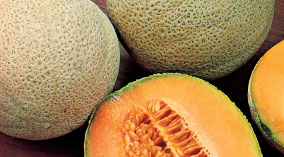The breaking news this week was that at least 13 people in eights states died after eating cantaloupe contaminated with listeria, a bacteria that can be very dangerous to the elderly or those with weak immune systems.
The cantaloupes were grown by the Colorado company Jensen Farms, which recalled the cantaloupes earlier this month. As of Monday, the federal Centers for Disease Control and Prevention reported that at least 72 people have fallen ill in 18 states since the outbreak began in late July.
Coincidentally, on Tuesday the Food and Drug Administration lifted import restrictions on cantaloupes from a Guatemala farm that had been recalled in March after they were linked to a multistate salmonella outbreak. The decision was somewhat controversial, as safe food advocates have accused the importer, Del Monte Fresh Produce, of trying to bully the F.D.A by filing a lawsuit against the agency.
While I've written about E. coli within the meat industry, foodborne illness from fruit and vegetables is an even more troubling issue because it is in many cases directly impacted by factory feedlot practices.
In fact, as Gretchen Goetz reports in Food Safety News:
"Cantaloupe is particularly susceptible to contamination because it grows on the ground, where it can come into contact with bacteria from animal feces harbored in soil or rainwater runoff."
When contaminated manure from cattle raised in factory feedlots is used to grow fruit and vegetables, there is an increased risk of tainted produce such as lettuce and spinach.
Currently two senior Democrats on the U.S. House Energy and Commerce Committee are calling for a hearing on the Jensen Farms listeria outbreak, which is the deadliest foodborne illness epidemic in more than a decade. Still, food safety seems to be treated as a wedge issue for some reason, so I doubt much headway will be made in terms of thoroughly investigating the company.

No comments:
Post a Comment